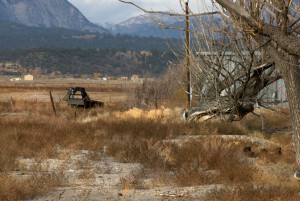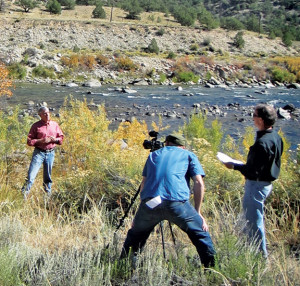By John Mattingly
We don’t choose our family – not in the same way we find best friends.
There are some who believe we do choose our family by way of interbreeding during past lives, or by subtle shifts in the fifth membrane of the universe, or through a vibrational command of DNA polymerase.
But, based on a preponderance of personal evidence, I conclude that I did not choose my family. It was a random outcome that I was born. And though speculations to the contrary have modest appeal from time to time, I’m sticking with the conclusion that my family is a chance assembly of folks, some of whom I would love or be friends with even if I had met them as strangers, and some of whom I have to wonder if we actually share a genetic history of any consequence.
Many people speak of the importance of blood: family is blood, and family members share blood with each other. This is not only a frail guarantee of loyalty, as even the Mafia has learned, but it’s a dangerous practical assumption. Blood types, immunity, cell counts and a myriad of other factors vary widely among family members. Just because someone is your blood relative doesn’t mean your blood will circulate harmoniously with theirs. In fact, a person is just as likely to get compatible blood from a stranger as from a family member.
The reference to blood could be a way of alluding to a shared genetic history and composition. People often say, “I got my dad’s genes for hard work,” or “Mom gave me good genes for organization.” But this association is even weaker than the popular fidelity to blood itself.
Humans have something in excess of 20,000 genes, but only seven of those genes influence skin pigmentation, and a mere 100 determine facial patterns and general morphology. The majority of human genes are more similar than different.
Even more worthy of note on the topic of broad human similarity is the discovery by Rebecca Cann, Mark Stoneking, and Allan Wilson that all humans on the earth today—all seven-some billion of us, California to New York, Siberia to Peru, China to England—have the same mitochondrial DNA. This means that we all descended from the same aboriginal mother about 200,000 years ago in lower east Africa.
Though it’s a challenge to grasp, and certainly makes a person wonder about old-world attitudes toward incest, these three scientists—from the fields of genetics, population genetics, and anthropology—used mutation proxies and mitochondrial DNA sequencing to determine that all humans on earth came from a single mother. Well, she was hardly a single mother, but she is the only mother of us all, now known as Mitochondrial Eve. (Google for the rest of the story.)
So, to all of you out there in the reading audience, and the rest of the globe, “How’s it goin’ there, cousin?”
Genetic information tends to unite all humans more broadly than specifically. My genes not only create a tie that binds me to my parents and siblings, it’s a tie that binds me to all of humanity. While blood and genes are typically touted as creating a special bond between people, these are actually quite indiscriminate in their bonding. The exception to this are genetic disorders that have a profound and very specific influence on offspring, but these are less prominent than the gestalt of shared genes among human individuals.
The broad reach of blood and genes in human bonding does not diminish the specific influence that homo sapiens sapiens have on family members. In most cases, family members, particularly moms and dads, make a powerful mark on us, mostly because human mammals are relatively weak for many years after birth. Most mammals hit the ground running. Not homo sapiens sapiens. No, we usually hit a soft bed followed by a nice bath, crying out to be fed, housed, clothed and educated for a couple of decades, sometimes longer. This gives human parents an opportunity to make quite an impression on their young – in fact, a much bigger impression than most mammals, who give their offspring about a year to figure it out, after which they’re on their own.
A popular theory is that the slow physical growth of the human is a necessary sacrifice for brain growth. Humans clearly have the biggest brains relative to body weight of all species on the planet, and it may be that it takes a lot of time to incubate and grow that brain. Other species have to devote so much time to the basic elements of survival, they cannot enjoy the luxury of laying around and growing a big brain. Great. By the time a typical homo sapiens sapiens is 18 years old, he or she has grown a brain of about 12 to 14 ounces, and human culture now considers them eligible to go to war to have their brains blown out, play sports to have their brains bashed, and drink alcohol to have their brains scrambled.
This seems like a terribly dark irony, but also a place where family can have a constructive influence. For instance, one would expect, perhaps even hope, that the troops returning from the Middle East would be less likely to encourage their offspring to continue a family tradition of military service, especially now that the utter folly of generals has been exposed. And now that we are learning more about brain damage from sports, family members will be more likely to read the fine print in liability waivers for their offspring to play violent contact sports.
As both a son and a parent, I tend to believe that influence among and between family members is guided and driven more by action and example than by genes and blood, or words. We seem to observe better than we listen. But we might learn about some unexpected, even extraordinary, influences among family members from the relatively new field of epigenetics.
Over the last couple of decades, geneticists have confirmed that there is a “beyond the genes” system that actually controls the way our genetic material expresses itself. Epigenetic systems are not fully understood, but are definitely observable. (See complete study of the isolated, 18th-century Swedish community of Norrbotten, together with numerous studies of twins separated at birth.)
What is now known of epigenetic systems shows us that the actions and habits of our grandparents and great-grandparents can have a material and profound influence on the way our genes express—an even greater influence than that of our parents.
Great. Just when we thought that all we had to do was work out our issues with our parents, it turns out they may be innocent bystanders. For those who believe in past life therapy, the session room is about to get really crowded.


